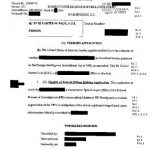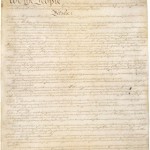Since it’s all the rage, I took time to read the Carter Page FISA warrant applications. There’s a torrent of social media and cable news about what these documents prove. A great deal of the commentary starts with and seems to emphasize a particular fact that is technically true. The documents released consist of 412 […]
Fourth Amendment Probable Cause for a Warrantless Arrest
A police officer cannot arrest a citizen without a warrant based upon a hunch or mere suspicion. He must have “probable cause”. The US Constitution‘s Fourth Amendment[1] requires a warrant for a person or his property to be “seized” or searched by a government agent. The law has developed allowing government agents to conduct warrantless […]
Courageous NSA Ruling by Judge Leon Respects Privacy and Fourth Amendment
On December 16, 2013 US District Court Judge Richard Leon took on arguments[1] that over the years have been used to expand government intrusion into American life in ways that would have left James Madison “aghast”.[2] His opinion in Klayman v. Obama finds much of the National Security Agency’s (NSA) surveillance collection of “telephony metadata” […]
Fourth Amendment Origins: Court Battles Lead to Revolution
“The house of every one is to him as his castle and fortress, as well for his defence against injury and violence as for his repose.” Sir Edward Coke,[1] 1604 “They who can give up essential liberty to obtain a little temporary safety, deserve neither liberty nor safety.” Benjamin Franklin,[2] 1755 “… one of the most essential branches […]
Arrest Warrants Issued in the United States
A judge commanding law enforcement officials to bring a wanted person before the court to answer to criminal charges issues an arrest warrant. The Fourth Amendment[1] to the US Constitution commands that the following conditions exist for an arrest warrant to issue: “The right of the people to be secure in their persons … against […]
Article IV of the US Constitution: Obligations of the States & Federal Government
Articles I, II and III define the legislative, executive and judicial branches of government respectively. The US Constitution’s Article Four defines relationships among the governments regarding the following: recognition of each government’s official acts, how a State treats the citizens of another state, extradition of criminal fugitives, return of slaves, admission of new States, and […]
The United States Felony Process
Americans are being locked up at ever increasing rates. Knowledge of the process leading to this result is important for all citizens. In 2008 the Washington Post reported that more than 1 of every 100 Americans was incarcerated. While there was a slight drop in Americans in jail or prison in 2011, the United States […]











